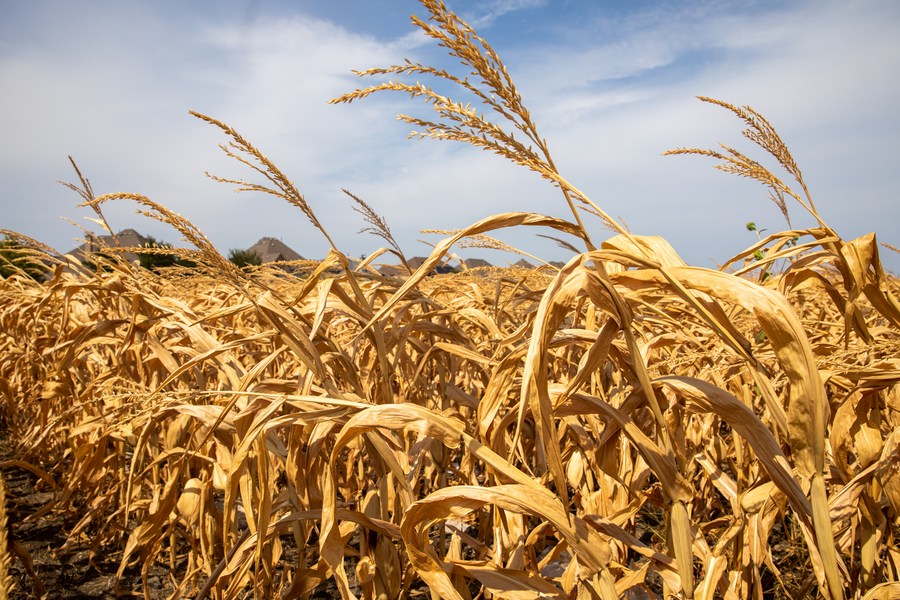Heatwaves send another climate warning, highlighting need for green actions


BEIJING - Exceptional heatwaves have been sweeping across much of the Northern Hemisphere for several weeks, where blazing weather has paralyzed infrastructure, harmed food production and threatened energy security.
Experts warn that the occurrence of extreme heatwaves simultaneously worldwide is no coincidence. Climate change is making heatwaves more frequent and intense, Chao Qingchen, director and researcher of China's National Climate Center, told Xinhua.
As a "wake-up call" for green cooperation in safeguarding the climate, food and energy security, the extreme weather events highlight the need for global joint efforts to cut emissions and shift to more renewable energies.

Heatwaves
Record-breaking temperatures have caused drought and wildfires in Europe.
In Britain, temperatures breached 40 degrees Celsius on July 19, the first time in history. Local authorities have warned of travel disruptions and suggested people work from home in the coming days.
France has been experiencing a sweltering summer, and firefighters across the country have raised concerns over the growing possibility of wildfires.
Western France has been subjected to unprecedented temperatures, French daily Le Monde reported on July 19. The third most intense heatwave was observed in France since 1947, and "there is still no end in sight," it said.
Italy is bracing for a record hot July, with a red alert warning for extreme heat issued in 16 cities last week. Several parts of Italy have seen wildfires, including a massive one in the central region of Tuscany, which has burned more than 850 hectares of land and forced more than 1,000 people to evacuate.
Local authorities said the country's national firefighting corps intervened in 32,921 wildfires from June 15 to July 21, 4,040 more than in the same period last year.
Heatwaves have also scorched parts of China. On Thursday, the country's national observatory continued to issue an orange alert for high temperatures. In parts of Zhejiang, Jiangxi and Xinjiang, temperatures may exceed 40 degrees Celsius, said China's National Meteorological Center.
Tens of millions of people across the United States have been living under various heat advisories and warnings last week in more than two dozen states, from parts of the American West to New England. The extreme heat was most intense in the southern Plains and Lower Mississippi Valley.
Heatwaves are occurring more often than they used to in major cities across the country, according to the US Environmental Protection Agency.
The agency said that prolonged exposure to excessive heat could damage crops, injure or kill livestock, and increase the risk of wildfires, adding that prolonged periods of extreme heat can lead to power outages as heavy demands for air conditioning strain the power grid.

Climate warning
The record-shredding temperatures would have been "virtually impossible" in Britain in an "undisrupted climate," said Stephen Belcher, chief scientist at the Met Office, Britain's national weather service.
"But climate change driven by greenhouse gases have made these temperatures possible, and we're actually seeing that possibility now," Belcher said, adding that if the world keeps emitting greenhouse gases at current levels, such heatwaves are likely to occur in Britain every three years.
The temperatures have been a couple of degrees warmer than during previous heatwaves, Matt Lanza, a meteorologist with Space City Weather, told the Houston Chronicle, adding "that is very consistent with what is expected in climate change."
"Human-caused climate change is intensifying heatwaves, droughts and flooding events," said Richard Allan, professor of climate science at the University of Reading.

The global heatwaves should be a warning for the future, The Washington Post wrote in an editorial, underlining that "a greater rise in temperature would be even more calamitous, with unthinkable consequences for global hunger, disease, migration, productivity and standards of living."
Sizzling temperatures have impacted agricultural production, creating a knock-on effect on food prices.
For example, Italy's agricultural association Coldiretti has warned that the drought has threatened 30-40 percent of the national seasonal harvest. Milk production will decline in the following weeks due to overheated livestock.
The extreme heat has pushed Europe's power system to "the limit," testing energy policies typically geared toward meeting demand in winter, Bloomberg reported, adding that "the hot weather is exacerbating Europe's worst energy crisis in decades."
The heat engulfing Japan brought about the shortest rainy season in the Tokyo area since records became available in 1951. For the first time in seven years, the Japanese government requested that businesses and households conserve electricity for three months to avoid a power crunch as temperatures hit record highs.

Call for green actions
In response to the challenges posed by heatwaves, several US cities appointed chief heat officers in 2021, while the city of Los Angeles announced the appointment of Marta Segura as its first-ever chief heat officer in early June this year.
"If we don't modernize our infrastructure and create climate-adapted cities and revise our building codes, it's going to get worse, and it's going to get more uninhabitable," Segura said in an interview with National Public Radio on July 23.
Efforts will be made to create cool surfaces and cool roofs to reduce the greenhouse gas emissions of buildings and infrastructure and "reduce what's called the urban heat island," said Segura.
China attaches great importance to adapting to climate change, said Chao, mentioning the national climate change adaptation strategy 2035, which has detailed measures to boost China's climate change monitoring and risk prevention capabilities.
Chao said that various sectors and industries have issued action plans on adapting to climate change to empower the country to build a climate-resilient society by 2035.
From "melted" airport runways to "exhausted" front-line staff, the likely economic impacts of the extreme heat "are staggering," said Cameron Hepburn, director of the Smith School of Enterprise and the Environment at the University of Oxford.
"Some people say the cost of transitioning from fossil fuels will be too high, but the opposite is true -- the true cost of inaction on climate change is both economically and socially untenable," Hepburn said. "We know that investing in green energy like wind and solar leads to more jobs, cheaper energy costs and limits the risks of impacts like extreme weather."

Sam Fankhauser, professor of climate economics and policy at the University of Oxford, said that record-breaking energy bills were replaced in the headlines by record-breaking heat, which was a stark reminder of the risks of climate change and the urgent need to decrease global carbon emissions.
"We cannot solve one problem by aggravating the other," Fankhauser said. "Any new fossil fuel investment should be seen as 'borrowing emissions from the future' -- and increasing the risks of extreme weather like we are seeing today."
"We must seize this opportunity to further invest in clean energy, greenhouse gas removal and reforming energy sector policy and fiscal strategy," Fankhauser said.
"These extreme weather events are a big wake-up call for leaders, whether in business or in government, to really act in increasing the emission reductions that should be undertaken already," Angela Consuelo Ibay, climate change and energy program head at World Wide Fund for Nature Philippines, told Xinhua.
























